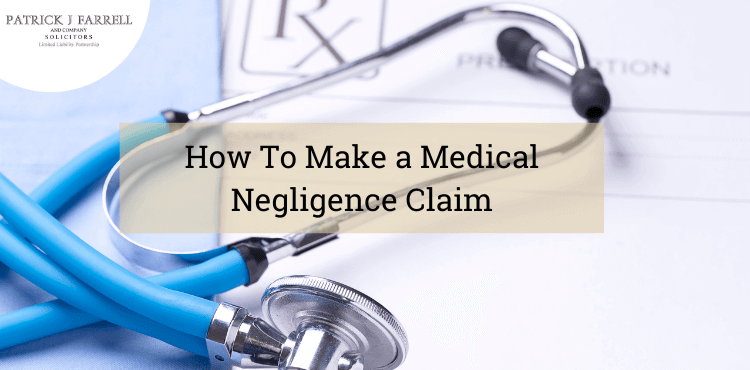How To Make a Medical Negligence Claim


When undergoing any medical treatment, we trust healthcare professionals with our health and well-being. However, if that trust is breached due to substandard care, resulting in injury or harm, it may be necessary to make a medical negligence claim.
Your first step should be to contact a qualified solicitor specialising in Medical Negligence. This guide outlines the steps involved in making a medical negligence claim under Irish law. This article should not be seen as legal advice, it’s just a guide highlighting the process you should take.

Helen Coughlan is a partner and advises on medical negligence*, family law and personal injuries*. Helen is a qualified family mediator and collaborative law practitioner and is Chairperson of the Family and Child Law Committee of the Law Society.
Medical negligence, also known as clinical negligence, occurs when healthcare professionals provide care that falls below the accepted standard, causing injury or harm to the patient. This can include misdiagnosis, surgical errors, medication mistakes, and failure to obtain informed consent, among other serious issues.
Medical Negligence claims are based on the principle that healthcare providers owe a duty of care to their patients, and that breaching or neglecting this duty can result in legal liability. Claims can arise when a patient suffers harm, injury or distress as a direct result of substandard care by a healthcare professional or medical institution.
The first step in making a medical negligence claim is to consult with a solicitor experienced in this field. Medical negligence law is complex, and a specialised solicitor can provide you with advice tailored to your specific situation.
They will assess the merits of your case, help you determine whether you are eligible, advise you on the likelihood of success, and guide you through the process Patrick J Farrell Solicitors specialise in medical negligence, don’t hesitate to contact us regarding your concerns and to see if you’ve potentially been involved in medical negligence.
Your solicitor will request your complete medical records, which are crucial for supporting your claim. These records provide evidence of the care you received and are essential for establishing a case of negligence.
It may be necessary to have an independent medical expert (in the relevant field) assess your case to determine whether the care you received fell below the expected standard and if this caused your injury or harm. This expert opinion is vital for proving negligence.
Once your solicitor has gathered all necessary evidence and expert opinions, they will draft a Letter of Claim. This letter outlines the details of your claim, the nature of the negligence, and the resulting harm or injury. It is sent to the healthcare provider or their legal representatives.
The healthcare provider, through their legal team, will respond to the Letter of Claim. They may accept responsibility and offer a settlement, or they may dispute the claim, leading to further legal proceedings.
Many medical negligence cases are settled out of court. Your solicitor will negotiate on your behalf for a fair compensation amount that covers your injuries, any financial losses, and future care needs. If a settlement cannot be reached, your case may proceed to court.
If your case goes to court, it will be heard before a judge. Both sides will present their evidence, and the judge will make a decision based on the merits of the case. Court proceedings can be lengthy and emotionally challenging, but your solicitor will support you throughout the process.
In Ireland, there is a general time limit of two years from the date of the incident or from the date when you first became aware of the harm to make a medical negligence claim. However, there are exceptions, so it’s crucial to seek legal advice as soon as possible.
Making a medical negligence claim in Ireland involves a detailed and structured process. It requires gathering substantial evidence, including medical records and expert opinions, to establish negligence. With the guidance of a specialised solicitor, you can navigate this complex legal landscape. While the process can be challenging, it’s a necessary step for seeking justice and compensation for the harm suffered due to substandard medical care.
Remember, every medical negligence case is unique, and this guide provides a general overview. For advice specific to your situation, consult one of our experienced solicitors for advice on medical negligence claims in Ireland.
At Patrick J Farrell & Company Solicitors, we understand the profound impact medical negligence can have on your life. With a legacy founded by Patrick J. Farrell and carried forward by a dedicated team, we have been advocates for justice for over four decades. Our commitment to putting our clients’ interests first, combined with our extensive legal expertise, makes us the ideal partners in your pursuit of justice.
From the moment you walk through our doors to the resolution of your case, you’ll be treated with the utmost courtesy, respect, and understanding. Choose us – where your well-being is our top priority. Reach out to us today and let our experienced solicitors guide you every step of the way.
Delayed Diagnosis ClaimsHow To Make a Medical Negligence Claim
Making a Medical Negligence Claim
Birth Injury Claims: Guide to Concerns and Compensation
Will Irish healthcare issues cause an increase in medical negligence claims?
Plastic Surgery and Cosmetic Procedures
Hip replacements and joint replacements
Understanding Healthcare-Associated Infection (HAI) Claims
Hip replacements and joint replacements